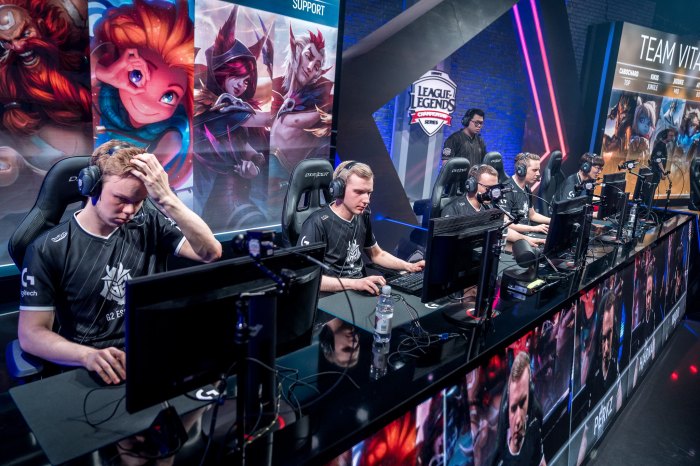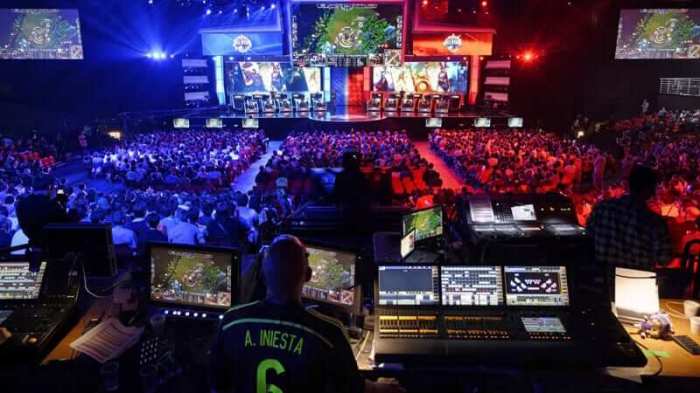Build successful career competitive gaming industry esports – Build a successful career in the competitive gaming industry, esports, isn’t just about lightning-fast reflexes and killer aim; it’s a multifaceted business demanding strategic thinking, relentless dedication, and a keen understanding of the market. This guide unveils the secrets to building a thriving esports career, from mastering essential skills and crafting a compelling personal brand to navigating the industry’s complexities and securing lucrative sponsorships.
We’ll explore the diverse roles within esports, analyze successful career trajectories, and equip you with the knowledge to conquer the challenges and seize the opportunities this dynamic field presents. Get ready to level up your career game.
This comprehensive guide delves into the critical aspects of building a sustainable and successful esports career. We’ll dissect the essential technical and soft skills needed to excel, outlining structured training regimens and strategies for building a powerful online presence. You’ll learn how to navigate the various career paths within the industry, from professional player to coach, manager, or content creator.
We’ll cover crucial aspects like securing sponsorships, managing finances, and maintaining your physical and mental well-being amidst the demanding competitive landscape. Through case studies of successful esports professionals, we’ll illuminate the key factors that drive success and provide actionable insights to help you forge your own path to victory.
Maintaining a Sustainable Career

The esports industry, while glamorous, demands a shrewd business mind to ensure longevity. A successful esports career isn’t just about skill; it’s about financial prudence, proactive health management, and the ability to adapt to the ever-shifting landscape. Ignoring these crucial elements can lead to burnout and a premature end to a promising career.
Let’s delve into the practical strategies that will help you build a sustainable future in competitive gaming.
Esports Professional Budget: Income and Expenses
Creating a realistic budget is paramount. Ignoring expenses can lead to financial instability, a significant stressor that negatively impacts performance. The following example illustrates a potential budget, keeping in mind that individual circumstances will vary significantly based on game, region, and sponsorship deals.
| Income Source | Monthly Estimate (USD) |
|---|---|
| Tournament Winnings | $2,000
|
| Streaming Revenue (Twitch, YouTube) | $500
|
| Sponsorships/Endorsements | $0
|
| Coaching/Mentoring | $0
|
| Expense Category | Monthly Estimate (USD) |
|---|---|
| Housing | $1,000
|
| Food | $500
Want to dominate your FPS game? Sharpen your reflexes and boost your win rate by checking out this guide on how to improve reaction time in competitive gaming FPS. However, remember that excessive gaming can be detrimental. If you’re struggling with gaming addiction, prioritizing your mental health is crucial. Discover effective strategies and recovery tips by exploring this insightful resource on how to overcome gaming addiction and reclaim control of your life. A balanced approach to gaming is key to success and well-being.
|
| Internet/Utilities | $150
Want to dominate your FPS game? Sharpening your reflexes is key, and that’s where understanding how to improve reaction time competitive gaming FPS comes in. This isn’t just about clicking faster; it’s about strategic training and mindful practice. However, remember that excessive gaming can lead to addiction. If you find yourself struggling, check out these resources on overcome gaming addiction effective strategies recovery tips to maintain a healthy balance and avoid burnout. Ultimately, mastering your game requires both skill and self-awareness.
|
| Gaming Equipment (Maintenance/Upgrades) | $100
|
| Travel (Tournaments, Bootcamps) | $200
|
| Coaching/Training | $0
|
| Health Insurance/Medical Expenses | $100
|
| Taxes | (Variable, consult a tax professional) |
Remember: This is a sample budget. Your actual income and expenses will vary. It’s crucial to track your finances meticulously and adjust your budget accordingly.
Burnout Prevention and Mental/Physical Health
The relentless pressure of competition and the demanding practice schedule can quickly lead to burnout. Proactive health management is non-negotiable. This includes prioritizing sleep, regular exercise, and a balanced diet.A sample plan might include:
- Sleep Schedule:Aim for 7-9 hours of quality sleep per night. Maintaining a consistent sleep schedule is crucial for optimal cognitive function and performance.
- Exercise Routine:Incorporate at least 30 minutes of moderate-intensity exercise most days of the week. This can include activities like running, weight training, or yoga. Physical activity reduces stress and improves mood.
- Balanced Diet:Focus on consuming whole, unprocessed foods, including fruits, vegetables, lean protein, and whole grains. Avoid excessive sugar and processed foods.
- Mental Health Strategies:Practice mindfulness techniques like meditation or deep breathing exercises. Consider seeking professional help from a therapist or counselor if needed.
- Time Off:Schedule regular breaks from gaming to avoid burnout. This could involve engaging in hobbies, spending time with loved ones, or simply relaxing.
Adapting to Industry Changes and Maintaining Long-Term Success, Build successful career competitive gaming industry esports
The esports industry is constantly evolving. New games emerge, meta shifts, and player bases fluctuate. To maintain long-term success, continuous learning and adaptation are vital.Strategies for adaptation include:
- Stay Updated:Follow industry news, analyze meta shifts, and continuously improve your skills. Attend industry events and workshops to stay informed about new trends and opportunities.
- Diversify Income Streams:Don’t rely solely on tournament winnings. Explore other avenues like streaming, coaching, content creation, and brand sponsorships.
- Network Strategically:Build relationships with other players, coaches, organizations, and industry professionals. Networking can open doors to new opportunities and collaborations.
- Develop Marketable Skills:Beyond gaming skills, cultivate transferable skills like communication, teamwork, and strategic thinking. These skills are valuable in various fields, providing a safety net should your gaming career change.
- Financial Planning:Invest wisely and plan for the future. Consult with a financial advisor to create a long-term financial strategy that secures your future beyond your competitive gaming years.
Illustrative Examples of Successful Esports Careers
The esports industry, while still relatively young, boasts a wealth of success stories. These individuals haven’t just achieved fame; they’ve built sustainable, lucrative careers, often defying traditional career paths. Examining their journeys reveals crucial strategies and highlights the hard work, dedication, and adaptability required to thrive in this competitive landscape.
Understanding these examples provides invaluable insights for aspiring esports professionals.
Below, we analyze the careers of several prominent esports figures, focusing on their key achievements and the strategic decisions that propelled them to success. These case studies showcase the diverse paths to success within the esports ecosystem, from competitive gaming to streaming and content creation.
Successful Esports Professionals: Case Studies
The following table provides a concise overview of the careers of several successful esports professionals. Note that success in esports is multifaceted and often involves a combination of skill, strategy, and adaptability.
| Player Name | Game | Key Achievements | Career Strategies |
|---|---|---|---|
| Oleksandr “s1mple” Kostyliev | Counter-Strike: Global Offensive (CS:GO) |
|
|
| Lee “Faker” Sang-hyeok | League of Legends (LoL) |
|
|
| Ninja (Richard Tyler Blevins) | Fortnite, various other games |
|
|
| Alistair “ali” Whyte | Rocket League |
|
|
Ultimate Conclusion: Build Successful Career Competitive Gaming Industry Esports

The esports industry is a thrilling and dynamic landscape, brimming with opportunities for those with the skill, dedication, and strategic mindset. Building a successful career requires a holistic approach, encompassing technical prowess, strong interpersonal skills, astute business acumen, and a relentless commitment to self-improvement.
By mastering the skills Artikeld in this guide – from honing your in-game abilities to cultivating a powerful personal brand and navigating the complexities of sponsorships and partnerships – you’ll significantly increase your chances of achieving sustainable success in this rapidly evolving field.
Remember, the journey to becoming a successful esports professional is a marathon, not a sprint. Stay focused, adapt to the ever-changing landscape, and never stop striving for excellence.
Question & Answer Hub
What is the average salary for a professional esports player?
Salaries vary wildly depending on game, skill level, team, and sponsorship deals. Some earn six figures, while others struggle to make a living wage.
How important is streaming for esports success?
Streaming can be a significant income source and a powerful tool for building a personal brand, but it’s not essential for all esports careers.
What if I’m not a top-tier player? Are there other opportunities?
Absolutely! Many roles exist, including coaching, management, analysis, content creation, and more.
How do I find an esports team?
Network actively within the community, participate in tournaments, and utilize online platforms designed for team recruitment.
How can I prevent burnout in esports?
Prioritize rest, maintain a healthy lifestyle, set realistic goals, and take breaks when needed. Mental health is crucial.
Leave a Reply